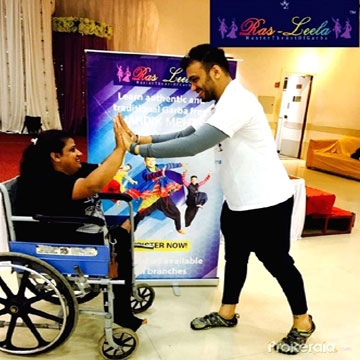 Mumbai
Mumbai: At several suburban Navratri venues in Mumbai, revellers suddenly stop in their tracks to view and admire a young man and a woman as they join the ongoing 10-day dance festivities -- on wheelchairs.
The duo occupies centre-stage at venues teeming with several thousands of dancers, and seated in their wheelchairs, they swing to the lilting tunes and musical beats -- but with hand movements (garba) and later with dandiyas (sticks).
There is also a deaf girl who can barely hear the cacophony around her, but she quietly "follows" the dance-steps of the individual before her and virtually melts into the crowds.
The trio belong to 'Rasleela - Master the Art of Garba' dance troupe run by hotelier-cum-choreographer Hardik Mehta in the Kandivali suburb, with three other branches.
"Probably inspired by the success of our paralympians and other prominent personalities who have conquered their physical disabilities, these three students have mustered great courage to do something which they love," Mehta, 33, told IANS.
The students are: Siddhi Shah, 30, working as a senior executive in a private company, Dhaval Shah, 26, working as a realtor -- both wheelchair-bound -- and hearing-disabled Jesal Shah, 30, an interior designer. All of them live in the suburbs.
The trio learnt of Rasleela through its social media networks and got in touch with Mehta who terms it "as the most unexpected request" for learning navratri dances.
"I was hesitant initially, but when I saw their passion to learn dance and challenge their own disability, I took up the gauntlet. I even decided to waive off the course fees for them and they have not disappointed me," Mehta smiled.
To enable Siddhi and Dhaval make the best of the opportunity, Mehta and his team of teachers designed special "hand movements" -- instead of normal dancing steps -- which could be performed sitting in their wheelchair. It clicked with the duo.
They managed to pick it up so well that they now confidently travel with a 45-member Rasleela troupe to various top navratri venues during the ongoing season.
Both Siddhi and Dhaval are guided to a central location and they join the dancers -- seated in their wheelchairs -- to the loud blaring music and even live orchestra performances at some of the major venues.
But dancing requires immense stamina; so they perform the rhythmic hand movements for 15-20 minutes, take a short break of five minutes, and resume, Mehta explained.
Enjoying the navratri for the first time with her newly-imbibed talent, Siddhi is all energetic, loves moving around on the wheelchair to join different groups of revellers at various venues -- and recently even travelled for a session to Surat, Gujarat, he adds proudly.
Afflicted by polio in her childhood, Siddhi always yearned to learn garba and dandiya, but the doors were slammed everywhere on her face -- till she met Mehta.
"I now feel I belong to the huge navratri family; I have learnt a lot of easy and difficult hand movements. It was tough, but there cannot be excuses for anything," said Siddhi, who is also an avid traveller, having roamed around a large part of India on her wheelchair.
Suffering from a spinal condition which left him disabled, Dhaval was earlier content with going around navratri venues, watching others dance and longing to join them, but did not know how to overcome his challenge.
"It was only after joining this class that I felt confident -- especially with Mehta who took so much trouble to train me," Dhaval said.
Jesal's hearing disability was a major dampener for her sheer passion for dancing, especially during navratri, and she joined Mehta's classes in 2015.
"She uses a hearing aid in normal course, but it's of little use in the open grounds... she could easily get out of rhythm or bump into the others dancing around her. I trained her to strictly follow the dance-steps of the person right in front of her. Now, she performs very well," Mehta said.
After the navratri season is over next Tuesday, and their confidence getting a mega-boost with their public performances, the trio hope to take part in the Rasleela's in-house dance competition.
Incidentally, Mumbai, with a Gujarati population of around five million, is one of the hotbeds for navratri celebrations after Gujarat, even attracting revellers from other communities who dance away merrily during the 10 nights annually. To cater to the dancing crowds for the mega-events held at various big-ticket venues, competitions with coveted prizes, scores of seasonal dancing classes mushroom all over the city.
They train young boys and girls, and even seniors, for the celebrations, levying fees ranging from Rs 2,500 to Rs 10,000 for a course of 6 to 10 sessions of varying hour
 Mumbai: At several suburban Navratri venues in Mumbai, revellers suddenly stop in their tracks to view and admire a young man and a woman as they join the ongoing 10-day dance festivities -- on wheelchairs.
Mumbai: At several suburban Navratri venues in Mumbai, revellers suddenly stop in their tracks to view and admire a young man and a woman as they join the ongoing 10-day dance festivities -- on wheelchairs.